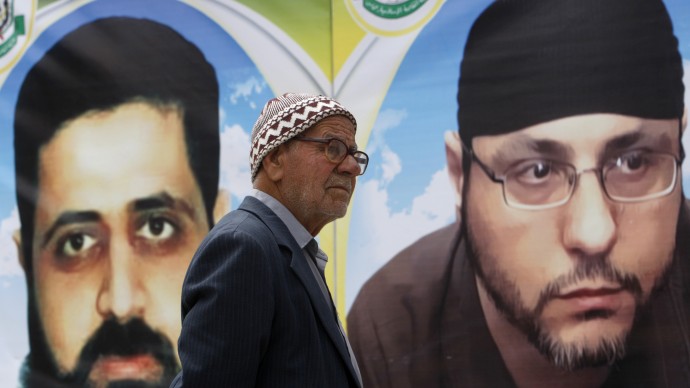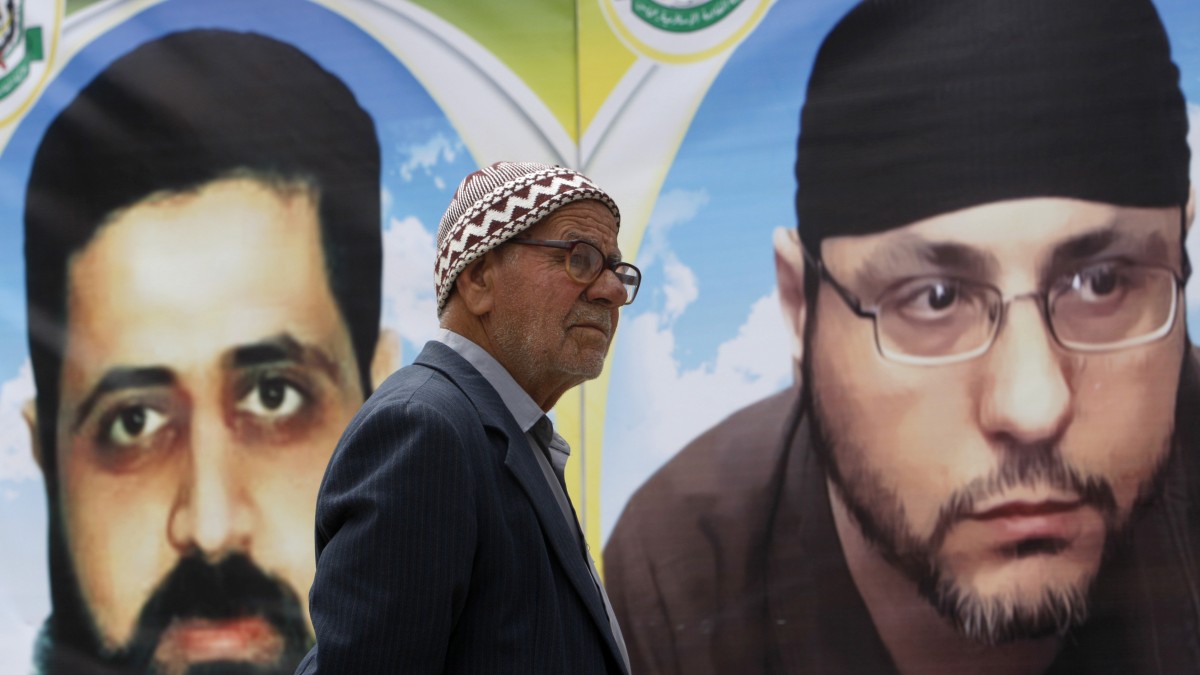
Update– Hunger strikes by some 2,000 Palestinian prisoners have ended in an Egyptian brokered deal that will ease the use of Israeli use of administrative detention without charge. The 308 people held under this order will either be set free or sentenced to crimes. Israel has also agreed to reforms that will bring about more humane conditions in prisons, namely: family visitations from the West Bank and Gaza, and an end to solitary confinement.
The mass hunger strikes began on April 17, but some protesters have been going without food for much longer-some for as long as 77 days. Israel acquiesced to prisoner demands over security concerns. Although all hunger strikers survived the ordeal, prisoner deaths would have likely resulted in violent protests across Israel, the West Bank, and Gaza.
(Mint Press)– Two months of ongoing hunger strikes by 1,500 Palestinian prisoners have entered an urgent phase as 10 prisoners have been hospitalized, with 2 reported to be in serious medical condition. Protesting Israeli administrative detention, the hunger strikes have gathered popular public support, with daily demonstrations in solidarity with the prisoners. The Obama administration has been mute on the hunger strikes and Western media has given paltry coverage to the non-violent resistance.
Now, more than 60 days into the strike, a number of prisoners have lapsed into grave medical condition, with the International Committee of the Red Cross issuing an urgent call this week for the immediate hospitalization of 6 prisoners in critical medical condition.
The tactic has seen a resurgence of late, with activists in the Arab Spring uprisings employing the method of resistance with increasing regularity. Approaching his 100th day of fasting, Bahraini activist Abdulhadi Khawaja vows to continue his fight against monarchical, anti-democratic rule by the al-Khalifa regime. While the specific goals of protesters vary from country to country, increasing numbers have chosen to go without food in life threatening attempts to create political reform.
Israel & Palestine: more than 64 years of conflict
Protesting what activists say is a practice of unlawful detention, 1,200 Palestinian prisoners began a simultaneous fast to protest these policies last month. Hundreds more joined shortly after, with many of Israel’s 4,699 Palestinian prisoners opting to forego one or two meals rather than undertake an indefinite fast.
Having roots in martial law under British Mandate Palestine, Israeli authorities can hold Palestinians for up to 60 days without charge. The detention can be renewed indefinitely if the prisoner is deemed to be a security threat by a military court. This practice has allowed Israel to hold some 319 Palestinians without charge and without due process rights to a trial.
Amended in 1979, Israeli administrative detention has been used almost exclusively against Palestinians deemed to be security threats. However, following the assassination of Israeli Prime Minister Yitzhak Rabin in 1995, several right-wing Jewish Israelis have been held under the order. Rabin was assassinated by an ultra-nationalist Jewish citizen opposed to any peace settlement with the Palestinians. The detention order has been used similarly for other Jewish Israelis suspected of plotting terrorist acts against moderate governments that negotiate for a two-state solution with the Palestinians.
Renowned Palestinian peace activist Dr. Mustafa Barghouti, who is also Secretary General of the Palestine National Initiative, praises previous hunger strikes by Khader Adnan and Hana Shalabi as an effective tool against Israeli occupation of the West Bank and arbitrary administrative detention.
Protests against Israeli occupation are nothing new, but following the violent first and second intifadas, a growing number of Palestinians are adopting non-violent methods of resistance in what Dr. Mustafa Barghouti describes as peaceful resistance in the best traditions of Ghandi and Dr. Martin Luther King. Speaking about the historical roots of the non-violent hunger strikes, Barghouti writes in a recent New York Times Op-Ed:
“Britain’s practices in Northern Ireland during the 1970s and 1980s were not so different from Israel’s today — and they elicited a similarly rebellious spirit from the subjugated population. In 1981, Bobby Sands, an imprisoned member of the Irish Republican Army, died 66 days after beginning a hunger strike to protest Britain’s treatment of political prisoners. Mr. Sands was elected to Parliament during his strike; nine other hunger strikers died before the end of 1981; and their cases drew worldwide attention to the plight of Roman Catholics in Northern Ireland.”
Khader Adnan, Hana Shalabi and thousands more
Khader Adnan, a man known to have ties with the militant Islamic-Jihad movement went on a 66 day hunger strike earlier this year. His case drew significant international attention as human rights groups including: Human Rights Watch, Amnesty International, and Physicians for Human Rights among others called for an end to his detention without charge.
In February, Adnan’s legal representation brokered a deal with the Israelis in which Adnan agreed to end his hunger strike in exchange for a release mid-April. Hana Shalabi, in a similar effort, was able to secure her release 43 days into a hunger strike, with authorities agreeing to transfer her to Gaza. Shalabi is from the West Bank and legal analysts argue that forcible transfers of populations or individuals are illegal under Article 27 of the Geneva Convention.
2006 elections gave rise to Hamas, a popularly elected militant Islamist group. Shortly thereafter, Israel began a military blockade of the Gaza strip, making it nearly impossible for Palestinians to travel into and out of the coastal enclave. Israel, along with several Western countries, considers Hamas to be a terrorist organization citing repeated rocket attacks in southern Israel. Shalabi’s transfer is troubling to activists and family concerned about her inability to travel to her home in the West Bank.
These actions by Adnan and Shalabi inspired the present hunger strike by some 1,500 Palestinian prisoners, a strong act of defiance against Israel’s policy of holding prisoners without charge or due process.
However, this hunger striking is but a means to an end, and is certainly not limited to use by Palestinians. In fact, developments in Bahrain could lead to the death of Abdulhadi Khawaja, an activist who has been on a hunger strike for nearly 100 days. Staying alive through forced intravenous nutrition, Khawaja remains in serious medical condition.
Bahrain
Activist Abdulhadi Khawaja has been on a hunger strike for more than 90 days, but remains in critical condition having lost much of his body weight.
Khawaja was given a life prison sentence by a military court in June 2011 for allegedly plotting against the state. He undertook a hunger strike and has been successful in securing a retrial. However, Khawaja was unable to attend a hearing on Tuesday, because he was too weak to appear in court. Speaking about her father’s commitments, Miryam Khawaja has said that her father “demands freedom” and is prepared to face death if he is not released immediately.
Although not nearly as violent as protests in Syria and Libya, demonstrations in Bahrain have taken a decidedly violent turn with an estimated 60 fatalities since the beginning of protests more than a year ago. Fatalities and injuries are hard to record given the highly limited access granted to journalists and Western human rights organizations.
However, the June 2011 Bahrain Independent Commission reported numerous human rights violations including: 46 activist deaths, 559 allegations of torture by the military, and over 4,000 cases of employees being dismissed by employers for their involvement in protests.
The report was commissioned by King Hamad Bin Isa Al Khalifa in a surprising moment of self-scrutiny for the monarchy. The UN deemed the investigation to be thorough and fair as President Barack Obama praised the commission saying, “By providing an independent assessment of what happened and identifying those responsible, the Royal Commission will play an essential role in advancing reconciliation, justice, and peace in Bahrain.”
However, the comments made July last year remain mostly unfulfilled as Bahraini protesters continue to press for major political reforms in the small Persian Gulf country. Activists are calling for an end to monarchical rule, major economic overhauls, and the institution of a citizen led democratic political system.
The Obama administration has taken a stance against continued violence by both sides, calling for a non-violent solution to the conflict. In an interview the the BBC March, 2011 Secretary of State Hillary Clinton told reporters, “We deplore the use of force against demonstrators, and we deplore the use of force by demonstrators. We want a peaceful resolution.”
Although condemnation by the U.S. has been consistent with supposed American commitments to democracy promotion and human rights, The Department of Defence approved a $53 billion dollar arms sale agreement to Bahrain in September, 2011. The arms sale is puzzling given America’s insistence that Bahrain be placed on the United Nations Human Rights Council’s list of human rights violators last June.


